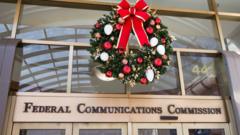In a major ruling, the court's decision to reject the reinstatement of net neutrality rules leaves internet regulation in a state of uncertainty.
Court Upholds Decision Against Net Neutrality, Sparking Controversy

Court Upholds Decision Against Net Neutrality, Sparking Controversy
US Court Dismisses Biden Administration's Net Neutrality Regulations, Shifting Focus to Congress
In a decisive ruling, a US court has ruled against the Biden administration's attempts to revive net neutrality regulations, declaring the federal government's reach over internet service providers as overstepping its authority. This ruling poses a significant setback for advocates of an open internet, who have been campaigning for regulatory protections that ensure all legal content is treated equally by internet service providers (ISPs).
First enacted under former President Barack Obama, net neutrality rules faced repeal in Donald Trump's first term. The timing of this new ruling arrives as Trump readies for a potential return to the White House, possibly signaling the end of the prolonged legal tussle surrounding this crucial issue. The judges highlighted the inconsistency of various administrations regarding internet regulations, stating that they no longer need to follow the Federal Communications Commission's (FCC) interpretations due to recent Supreme Court rulings limiting federal agencies' powers.
Republican FCC Commissioner Brendan Carr hailed the court’s decision as a victory, dismissing the Biden administration's arguments as an attempted "Internet power grab." Interestingly, Jessica Rosenworcel, the outgoing Democratic commissioner, urged Congress to step forward, echoing consumer demands for a reliable and fair internet.
The battle over net neutrality has been a contentious juncture in American digital policy, having previously mobilized public support through media campaigns, including calls to action from figures like comedian John Oliver. While the recent decision does not interfere with state-level net neutrality legislation, advocates emphasize the necessity of national regulations to curb ISP control over content delivery.
Public interest groups have expressed concerns, arguing this ruling undermines the FCC's capability to protect consumer rights and privacy standards, contending that internet providers were mischaracterized solely as information services and not as telecommunications entities. They cautioned that the ruling has established a precarious regulatory vacuum, potentially allowing ISPs excessive control over internet access for Americans.
In contrast, industry associations like USTelecom argued that the ruling would benefit consumers by fostering greater investment and innovation within the competitive digital landscape, framing the decision as a win for broader market dynamics.
First enacted under former President Barack Obama, net neutrality rules faced repeal in Donald Trump's first term. The timing of this new ruling arrives as Trump readies for a potential return to the White House, possibly signaling the end of the prolonged legal tussle surrounding this crucial issue. The judges highlighted the inconsistency of various administrations regarding internet regulations, stating that they no longer need to follow the Federal Communications Commission's (FCC) interpretations due to recent Supreme Court rulings limiting federal agencies' powers.
Republican FCC Commissioner Brendan Carr hailed the court’s decision as a victory, dismissing the Biden administration's arguments as an attempted "Internet power grab." Interestingly, Jessica Rosenworcel, the outgoing Democratic commissioner, urged Congress to step forward, echoing consumer demands for a reliable and fair internet.
The battle over net neutrality has been a contentious juncture in American digital policy, having previously mobilized public support through media campaigns, including calls to action from figures like comedian John Oliver. While the recent decision does not interfere with state-level net neutrality legislation, advocates emphasize the necessity of national regulations to curb ISP control over content delivery.
Public interest groups have expressed concerns, arguing this ruling undermines the FCC's capability to protect consumer rights and privacy standards, contending that internet providers were mischaracterized solely as information services and not as telecommunications entities. They cautioned that the ruling has established a precarious regulatory vacuum, potentially allowing ISPs excessive control over internet access for Americans.
In contrast, industry associations like USTelecom argued that the ruling would benefit consumers by fostering greater investment and innovation within the competitive digital landscape, framing the decision as a win for broader market dynamics.




















